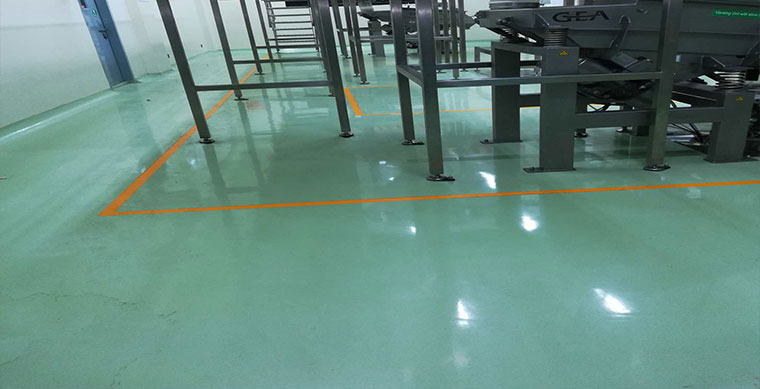
Epoxy flooring has gained immense popularity in recent years for its durability, aesthetics, and ease of maintenance. However, one question that often comes to mind when considering epoxy floors is, “Do epoxy floors scratch easily?” In this comprehensive article, we will delve into the characteristics of epoxy flooring and explore whether they are prone to scratches. Additionally, we’ll address some frequently asked questions to provide you with a holistic view of epoxy floors.
Contents
- 1 Epoxy Flooring: A Brief Overview:
- 2 Do Epoxy Floors Scratch Easily?
- 2.1 Benefits of Applying Polyurethane Over Epoxy Flooring:
- 2.2 Frequently Asked Questions (FAQs)
- 2.2.1 Can epoxy floors be used in high-traffic areas?
- 2.2.2 Are epoxy floors stain-resistant?
- 2.2.3 Can epoxy floors be installed over existing flooring?
- 2.2.4 Do epoxy floors require any special maintenance?
- 2.2.5 How long do epoxy floors last?
- 2.2.6 Are epoxy floors suitable for residential applications?
- 2.2.7 Can epoxy floors be customized in terms of color and design?
- 2.2.8 Can epoxy floors be slippery when wet?
- 2.2.9 How much does it cost to install epoxy flooring?
- 3 Bottom Line:
Epoxy Flooring: A Brief Overview:
Before we dive into the scratch resistance of epoxy floors, let’s briefly understand what epoxy flooring is. Epoxy flooring is a highly durable and versatile flooring solution that is created by applying a mixture of epoxy resin and hardeners to a prepared surface. When properly installed, epoxy forms a seamless, glossy, and incredibly tough surface that can withstand heavy foot traffic and various types of stress.
Epoxy floors are commonly used in residential, commercial, and industrial settings. They offer a range of benefits, such as:
- Durability: Epoxy floors are known for their exceptional durability, making them resistant to wear and tear over time.
- Aesthetics: Epoxy floors come in various colors, patterns, and finishes, allowing for customization and the creation of visually appealing surfaces.
- Low Maintenance: Epoxy floors are easy to clean and require minimal maintenance, making them ideal for high-traffic areas.
- Chemical Resistance: Epoxy floors are highly resistant to chemicals, making them suitable for industrial applications.
Do Epoxy Floors Scratch Easily?
The scratch resistance of epoxy floors primarily depends on several factors, including the quality of the epoxy, the surface preparation, and the type of topcoat used. Here are some key considerations:
- Epoxy Quality: The quality of the epoxy resin used significantly impacts scratch resistance. High-quality epoxy is formulated to be more resilient against scratches and damage. It is important to choose a reputable manufacturer or installer to ensure you get a durable product.
- Surface Preparation: Proper surface preparation is crucial for epoxy flooring. The surface must be clean, dry, and free from contaminants. A well-prepared surface ensures better adhesion, which contributes to the floor’s resistance against scratches.
- Topcoat: Many epoxy floors are finished with a topcoat, such as polyurethane or urethane. These topcoats enhance the scratch resistance of the epoxy. Polyurethane, in particular, provides excellent protection against scratches and UV damage.
- Usage and Maintenance: The frequency of maintenance and the level of traffic on the floor also play a role in scratch resistance. Regular cleaning and proper care can help maintain the floor’s appearance and minimize the risk of scratches.
To summarize, epoxy floors do not scratch easily when installed correctly with high-quality materials and maintained properly. They are designed to withstand everyday wear and tear, making them a durable flooring option.
Benefits of Applying Polyurethane Over Epoxy Flooring:
Polyurethane coatings over epoxy floors offer several advantages that make them an attractive option for various settings, from homes and offices to industrial warehouses and automotive shops.
- Enhanced Durability: Epoxy floors are known for their durability, but applying a polyurethane topcoat takes it to the next level. The additional layer of polyurethane provides extra resistance against abrasion, impact, and chemicals. This makes the floor more resilient and longer-lasting, reducing maintenance costs in the long run.
- Chemical Resistance: Epoxy floors are highly resistant to chemicals, but polyurethane adds an extra layer of protection. Whether you’re dealing with oil spills, acids, or harsh cleaning agents, a polyurethane over epoxy floor can withstand them without compromising its appearance or structural integrity.
- Gloss and Aesthetic Appeal: Polyurethane is known for its high-gloss finish, which enhances the overall look of the floor. Whether in a residential living room or a commercial showroom, the glossy appearance of polyurethane over epoxy can create an attractive and modern ambiance.
- UV Resistance: One of the downsides of epoxy is its susceptibility to UV damage over time. The addition of a polyurethane topcoat provides UV resistance, preventing the floor from yellowing or deteriorating when exposed to sunlight. This makes it a suitable choice for outdoor applications as well.
- Ease of Cleaning: Polyurethane over epoxy is incredibly easy to clean. The smooth, glossy surface doesn’t trap dirt and is simple to maintain with routine cleaning. This is particularly advantageous for commercial spaces that require a clean and professional appearance.
- Seamless Finish: The transition from epoxy to polyurethane creates a seamless surface without any joints or grout lines. This not only adds to the aesthetic appeal but also makes the floor easier to clean and maintain.
Frequently Asked Questions (FAQs)
Now that we’ve explored the scratch resistance of epoxy floors, let’s address some frequently asked questions to provide a more comprehensive understanding of epoxy flooring.
Can epoxy floors be used in high-traffic areas?
Yes, epoxy floors are an excellent choice for high-traffic areas. Their durability and resistance to wear and tear make them suitable for places like garages, warehouses, commercial spaces, and even residential spaces with heavy foot traffic.
Are epoxy floors stain-resistant?
Epoxy floors are generally resistant to stains from common household and industrial chemicals. However, prolonged exposure to harsh chemicals can still cause damage. To maintain their appearance, it’s important to clean up spills promptly.
Can epoxy floors be installed over existing flooring?
Epoxy floors can be installed over existing concrete or other suitable surfaces. Proper surface preparation is essential to ensure adhesion and the longevity of the epoxy coating.
Do epoxy floors require any special maintenance?
Epoxy floors are relatively low-maintenance. Regular sweeping or vacuuming to remove dirt and debris, as well as occasional mopping with a mild detergent, is typically sufficient. Avoid abrasive cleaners that could potentially scratch the surface.
How long do epoxy floors last?
With proper installation and maintenance, epoxy floors can last for many years. The lifespan can vary depending on factors such as traffic levels and the quality of the epoxy used. In commercial and industrial settings, epoxy floors can last 10-20 years or more.
Are epoxy floors suitable for residential applications?
Epoxy floors are becoming increasingly popular in residential settings due to their durability and aesthetic versatility. They are commonly used in basements, kitchens, living areas, and garages. They offer a wide range of design options, allowing homeowners to create unique and attractive spaces.
Can epoxy floors be customized in terms of color and design?
Yes, epoxy floors offer a high degree of customization. They come in various colors, patterns, and finishes, allowing homeowners and businesses to create unique designs that suit their preferences and branding.
Can epoxy floors be slippery when wet?
Epoxy floors can be slippery when wet. To mitigate this risk, anti-slip additives can be incorporated into the epoxy coating to improve traction. In areas where water exposure is common, such as garages and kitchens, it’s recommended to use epoxy coatings with added slip resistance.
How much does it cost to install epoxy flooring?
The cost of epoxy flooring installation varies depending on factors such as the size of the area, the condition of the existing surface, the type of epoxy, and any customization options. On average, epoxy flooring installation can cost between $3 and $12 per square foot.
Bottom Line:
In conclusion, epoxy floors are not prone to scratching when installed properly with high-quality materials and maintained appropriately. They offer exceptional durability, making them a popular choice for both residential and commercial spaces. Epoxy floors are not only resilient against scratches but also offer a wide range of customization options, making them a versatile and attractive flooring solution. To enjoy the full benefits of epoxy flooring, it’s essential to choose a reputable installer, adhere to maintenance recommendations, and, if necessary, incorporate protective topcoats.
Related Post:
- Epoxy and PU Flooring Company In Dhaka, Bangladesh
- Epoxy Flooring Supply And Application In Bangladesh
- Epoxy Coating and Paint Bangladesh
- Application Process Of Epoxy Flooring
- Can you epoxy wood floors?
- How to Make Epoxy Floors Shine?
- Are Epoxy Floors Expensive?
- Is Epoxy Flooring Slippery When Wet?
- How Much Does Epoxy Flooring Cost Per Square Foot?
- Is Epoxy Flooring Cheaper Than Tile?
- Is epoxy flooring fire resistant?
